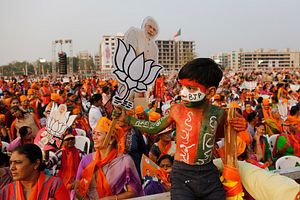Less than two months after India’s worst crisis with Pakistan since 2002, Indian Prime Minister Narendra Modi has made repeated references to nuclear dynamics between the two countries at election rally addresses. India’s general elections began earlier this month and will run into mid-May, with Modi’s nationally dominant Bharatiya Janata Party (BJP) hoping seize on its stewardship of India’s national security to maintain a dominant position in the Lok Sabha (the lower house of India’s bicameral parliament).
On April 17, at a campaign rally, Modi touted that India had called Pakistan’s nuclear bluff. It’s unclear if the prime minister was referring to a specific weapon. “Earlier, terrorists from Pakistan would come here and go back after conducting an attack. Pakistan would threaten us, saying it has the nuclear bomb and will press the button,” Modi said, underscoring what had long been a dilemma for India, whose conventionally superiority was undermined by Pakistan’s development of low-yield nuclear weapons in particular. “We have nuclear of nuclear bombs,” Modi said, intending to highlight India’s capabilities. “I decided to tell them, do whatever you want to do,” Modi added, promising that India would retaliate.
On April 20, at a separate rally, Modi returned to the theme: “Every other day, they used to say ‘we have nuclear button, we have nuclear button.’ What do we have then? Have we kept it for Diwali? (A Hindu holiday traditionally involving lights and firecrackers.)” Modi also discussed the events of February 26 and 27, when India and Pakistan nearly went to war. Referring to the capture of the Indian pilot whose MiG-21 Bison was shot down by Pakistan, Modi offered the first on-record Indian statement regarding a possible conventional missile strike on Pakistan by India. Describing what a “senior American official” had said in the third person, he said: “Modi has kept ready 12 missiles and might attack and the situation will deteriorate… Pakistan announced they would return the pilot on the second day.” In doing so, Modi provided the first on-record Indian confirmation of reports citing Pakistani officials of possible conventional missile strikes as retaliation after the Pakistan Air Force retaliated on February 27. Indian official sources had denied those reports.
These utterances are unusual from an Indian prime minister, but underscore the extent to which the nationalist BJP is leaning on its national security credentials and India’s military capabilities to appeal to voters seeking to reconstitute a government after the general elections. Immediately after its nuclear tests in 1998, India embarked on a two-decade campaign to underscore its status as a “responsible” nuclear power. It released a draft nuclear doctrine in 1999, which was finalized in 2003 and included the articulation of a conditional no first-use policy. Meanwhile, as India pursued the normalization of its nuclear status, even as it remains a nonsignatory to the Treaty on the Nonproliferation of Nuclear Weapons, senior Indian officials and diplomats would point to India’s relative restraint with nuclear weapons—a comparison that was all-the-starker in South Asia given Pakistan’s rapidly growing arsenal, aggressive nuclear strategy predicated on first-use, and development of low-yield nuclear weapons.
Modi, of course, isn’t the first Indian prime minister to make public remarks touting India’s nuclear capabilities. His BJP predecessor Atal Behari Vajpayee, the prime minister who directed India’s nuclear tests in 1998, said in 2000 that India was “being threatened [by Pakistan] with a nuclear attack.” “Do they understand what it means? If they think we would wait for them to drop a bomb and face destruction, they are mistaken,” he said in remarks that were at odds with India’s 1999 draft nuclear doctrine, which noted that “India will not be the first to initiate a nuclear strike.”
The context of Modi’s remarks on nuclear weapons — election rallies — matter, of course. With a poor economic track record since 2014, the BJP has rightly decided to focus on what much of the Indian public perceives as a strength: its management of national security and defense. Within India, the decision by Modi to retaliate using conventional air power into Pakistani territory after the February 14 Pulwama attack was widely popular. But utterances on nuclear weapons do not take place in a vacuum and Modi’s remarks will be heard across the world.
Pakistan has already seized on the opportunity to chide India for Modi’s comments. A Pakistani Foreign Ministry spokesman released a statement on Monday noting that “Pakistan considers these remarks as highly unfortunate and irresponsible.” “Such rhetoric for short-term political and electoral gains, with complete disregard to its effects on strategic stability in South Asia is regrettable and against norms of responsible nuclear behaviour,” the statement added.
































